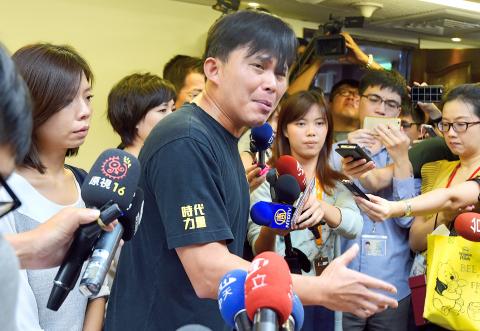Procedural moves by the Democratic Progressive Party (DPP) to push through controversial amendments to the Labor Standards Act (勞動基準法) have betrayed promises for congressional reform, New Power Party (NPP) Executive Chairman Huang Kuo-chang (黃國昌) said yesterday.
At a meeting of the legislature’s Social Welfare and Environmental Hygiene Committee, the committee’s DPP majority confirmed the minutes of an Oct. 5 meeting, in which amendments to the act were reviewed.
Committee co-convener Wu Yu-chin (吳玉琴) of the DPP refused to consider a NPP motion demanding discussion of purported procedural flaws at the earlier meeting.

Photo: Chien Jung-fong, Taipei Times
NPP legislators sat quietly on the sidelines during an initial fracas between DPP and Chinese Nationalist Party (KMT) lawmakers at the opening of the meeting, but Huang made a start for the front of the room after Wu announced that his party’s resolution would not be considered and was visibly agitated afterward, shedding tears.
“I was absolutely shocked when [Wu] announced that she would not consider the motion,” Huang said. “It is unacceptable that she was not even willing to address such an important procedural question.”
“What right does [the DPP] have to refuse to deal with this?” he asked. “Does it think that the Legislative Yuan is a company it manages?”
The NPP’s motion called for the committee’s move to send draft amendments directly to cross-caucus negotiations to be invalidated, citing what was reportedly a mistake by co-convener Chen Ying (陳瑩) of the DPP in reading the sending resolution.
Rather than reading the sending resolution itself, Chen repeated the title and text of an earlier resolution, invalidating the vote, Huang said, adding that current meeting minutes falsely imply a unanimous agreement to the earlier resolution to cut off discussions.
“Today’s meeting was a shameless display, because they did not dare accept scrutiny,” he said.
“The issue now is not just about the DPP’s plans for a five-day workweek, the problem is the future direction of the legislature,” NPP caucus convener Hsu Yung-ming (徐永明) said. “Over the past two days, we have felt like we are in hell — not because of all the conflict, but because it appears that all of our efforts to push congressional reforms have been lost in a new vicious cycle.”
Opposition to allowing details of major legislation to be determined in “opaque cross-caucus negotiations” was a key plank of the NPP’s legislative platform, with the party advocating “committee-centric” reviews of bills to increase transparency.
In related news, prominent Sunflower movement leader Wang Yi-kai (王奕凱) attempted to storm the Legislative Yuan last night to protest the confirmation of the meeting minutes, but was swiftly intercepted by police, attracting a crowd of people in response to an online call to action.
Most of the crowd stood aside and watched as he charged down Jinan Road and attempted to use a ladder to scale the Legislative Yuan’s low eastern wall, but a handful of people joined him in a sit-in in the middle of the intersection of Zhongshan S and Jinan roads after he was released by police.

Chinese Nationalist Party (KMT) Chairman Eric Chu (朱立倫), spokeswoman Yang Chih-yu (楊智伃) and Legislator Hsieh Lung-chieh (謝龍介) would be summoned by police for questioning for leading an illegal assembly on Thursday evening last week, Minister of the Interior Liu Shyh-fang (劉世芳) said today. The three KMT officials led an assembly outside the Taipei City Prosecutors’ Office, a restricted area where public assembly is not allowed, protesting the questioning of several KMT staff and searches of KMT headquarters and offices in a recall petition forgery case. Chu, Yang and Hsieh are all suspected of contravening the Assembly and Parade Act (集會遊行法) by holding

PRAISE: Japanese visitor Takashi Kubota said the Taiwanese temple architecture images showcased in the AI Art Gallery were the most impressive displays he saw Taiwan does not have an official pavilion at the World Expo in Osaka, Japan, because of its diplomatic predicament, but the government-backed Tech World pavilion is drawing interest with its unique recreations of works by Taiwanese artists. The pavilion features an artificial intelligence (AI)-based art gallery showcasing works of famous Taiwanese artists from the Japanese colonial period using innovative technologies. Among its main simulated displays are Eastern gouache paintings by Chen Chin (陳進), Lin Yu-shan (林玉山) and Kuo Hsueh-hu (郭雪湖), who were the three young Taiwanese painters selected for the East Asian Painting exhibition in 1927. Gouache is a water-based

Taiwan would welcome the return of Honduras as a diplomatic ally if its next president decides to make such a move, Minister of Foreign Affairs Lin Chia-lung (林佳龍) said yesterday. “Of course, we would welcome Honduras if they want to restore diplomatic ties with Taiwan after their elections,” Lin said at a meeting of the legislature’s Foreign Affairs and National Defense Committee, when asked to comment on statements made by two of the three Honduran presidential candidates during the presidential campaign in the Central American country. Taiwan is paying close attention to the region as a whole in the wake of a

OFF-TARGET: More than 30,000 participants were expected to take part in the Games next month, but only 6,550 foreign and 19,400 Taiwanese athletes have registered Taipei city councilors yesterday blasted the organizers of next month’s World Masters Games over sudden timetable and venue changes, which they said have caused thousands of participants to back out of the international sporting event, among other organizational issues. They also cited visa delays and political interference by China as reasons many foreign athletes are requesting refunds for the event, to be held from May 17 to 30. Jointly organized by the Taipei and New Taipei City governments, the games have been rocked by numerous controversies since preparations began in 2020. Taipei City Councilor Lin Yen-feng (林延鳳) said yesterday that new measures by